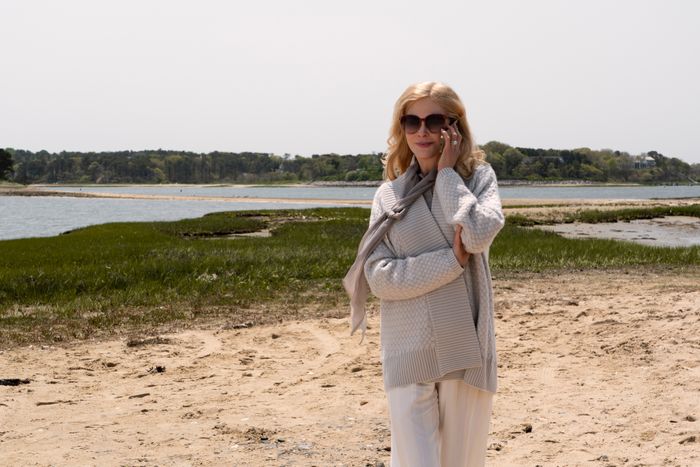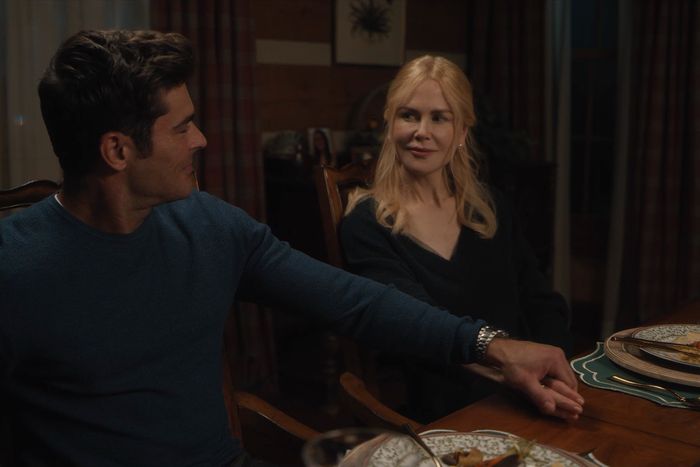
The first time Romy, the high-flying tech she-E-O played by Nicole Kidman in Babygirl, sees Samuel (Harris Dickinson), the intern she’ll have an affair with, he’s bringing an unruly dog to heel. Romy is headed to the office when the overexcited animal gets away from its owner and starts charging down the sidewalk right at her. Then Samuel steps up and summons the dog back in his direction with a show of easy dominance that ends with a caress and the praise “Good girl.” The gesture hits Romy like a lightning bolt, but Kidman doesn’t act the way you’d expect for a character who has just been poleaxed by desire. Instead, she stares at Dickinson with a shock more befitting someone who’s been told they only have a month to live — frozen in place, lips parted, eyes open wide. Kidman may be immaculate in an outfit composed of tasteful pearl-gray layers, looking every bit the successful executive whose domestic life is equally perfect, but the expression on her face in this moment is borderline comical. It’s a delightfully off-kilter choice for an erotic meet-cute, emphasizing not the sultriness of the encounter but how stricken Romy is to find herself undone by the sight of a 20-something petting a dog.
Typically, when an actress starts getting cast primarily as a wife and mother, it’s a signal that she’s run up against the edges of the industry’s limited imagination and that her opportunities to do interesting work are disappearing. And yet Kidman has been more visible than ever in 2024, making a five-course meal out of what can be described only as variations on the theme of the discontented matriarch. After kicking off 2024 with Expats, Lulu Wang’s miniseries about Americans living in Hong Kong, she reunited with Zac Efron, her co-star from The Paperboy, for the Netflix romantic comedy A Family Affair in June. She was back on the streaming service a few months later for another miniseries, The Perfect Couple, an adaptation of one of beach-read laureate Elin Hilderbrand’s novels. She’s currently reprising her part as an upper-echelon CIA official in season two of Paramount+’s Lioness, an outpost of Taylor Sheridan’s ever-growing television empire. Babygirl, written and directed by Halina Reijn, is out this month. That may look like a broad spectrum of work, stretching from prestige dramas to saucy A24 films. But whether she’s the ruthless head of an intelligence program or a beloved chick-lit author, Kidman is inevitably playing a woman who’s trying to maintain an image of perfection at home as well as outside it.
Kidman, who’s nearly six feet tall, impossibly willowy, and the precise shade of a scoop of vanilla ice cream, has never been an Everywoman. In addition to being a standard-bearer for a traditional vision of Anglo female beauty, one preserved in what’s widely assumed to be cosmetically enhanced immobility, she frequently plays characters who are well off. She’s a figure of aspiration, not relatability, which is precisely why her latest roles have been so fun. It’s in the fluffier stuff — the only semi-legible streaming rom-com, the frothy family drama, and Reijn’s revision of the erotic thriller, a smart movie that never gets too serious — that she’s most compelling. Her characters may suffer from age-old plights, but she plays them with a wink, an acknowledgment that they’re also absurdly privileged. In riffing on multiple versions of this type, she’s achieved a kind of escape velocity from the expected rhythms of these roles, coming up with versions that are amusingly indifferent or intentionally awkward, even borderline camp.
Take A Family Affair, the closest she’s come so far to making algorithmic slop, though it has a legitimate director in The Bridges of Madison County’s writer, Richard LaGravenese. It’s ostensibly a movie in which she plays a widow named Brooke Harwood who puts her personal life on hold to raise her daughter, Zara (Joey King), until she meets a movie star named Chris Cole (Efron), who is 16 years her junior and also, inconveniently, Zara’s boss. Only — Brooke doesn’t look or act like a woman who hasn’t thought of herself as a desirable being for years. She looks like Nicole Kidman in a series of understated knits that scream quiet luxury rather than casual comfort. Despite a high-drama setup involving an older woman, a massive celebrity, and a daughter who feels betrayed, Kidman never turns the dial up past seven, even when Zara walks in on an initial sexual encounter and shrieks in horror. As though admitting that the unexpected romance isn’t the film’s selling point, she is entertainingly mild-mannered throughout, including during the inevitable misunderstanding that briefly splits the lovers apart. In her scenes with Efron, she’s girlish and flirty, playing the part not like a woman breathless to find herself part of a fairy-tale romance but like someone who has finally met the kind of partner she deserves. The key moment in the film is a montage of the lovers absconding to Chris’s Malibu getaway for a trip that’s ridiculously, car-commercial lush. The pair kiss in the surf and golden sunlight and canoodle in blankets alongside a beach bonfire, and the absence of audible dialogue is a feature, not a bug. As we behold Kidman’s earnest face, Chris looks less like her lover than like the crowning accessory of an already idyllic life.
In The Perfect Couple, in which Kidman plays another writer, Greer Garrison Winbury, she doesn’t even bother with the pretense of normalcy. Greer, who lives on a Nantucket estate with her blue-blood husband, Tag (Liev Schreiber), with whom she has three sons, is so exaggeratedly ladylike that her performance of gender verges on drag. An aristocratic matriarch with a halo of blonde curls who prefers silk tops, floral dresses, and satin bathrobes, she safeguards her family’s reputation with a steely will, the nonstop policing of appearances, and a set of NDAs. Greer is meant to be imprisoned in a gilded cage of her own creation, having monetized her marriage and family by using them to market the best-selling novels that pay all their bills. She’s not just subject to the strict standards of respectability required to maintain their aspirational aura — she’s become their enforcer. But when her own dark secret comes out, it feels downright underwhelming compared with the low-key derangement of what Kidman has been doing up to that point.
Throughout The Perfect Couple, Kidman plays Greer as someone giving a performance that doesn’t end, even when she’s alone. She spends countless shots staring pensively out of windows at the water, often while draped in a chunky cardigan, and covers her face theatrically when confronted with an unwanted memory. “Goddamn it, Greer, shut the fuck up,” she murmurs dramatically to herself after a tense exchange with her son about her prospective daughter-in-law. The only audience for these gestures is us, and their implicit artifice makes them seem like nods Kidman is aiming directly at the viewer — an acknowledgment that, while we’re supposed to believe that Greer is miserable behind the flawless façade, even her performance of unhappiness looks aspirational.
It’s the genuinely good Babygirl that finds Kidman doing her most daring riff on a woman fighting to uphold an image of perfection while repressing any inconvenient needs. As the head of a tech company, Kidman affects an office version of the high femme with diaphanous blouses and soft updos. Romy is attempting to create a more accessible and enlightened model of leadership, an approach that extends to her supportive marriage to theater director Jacob (Antonio Banderas), with whom she has two kids and a lot of face-to-face, eye-contact-heavy sex that does nothing for her. Samuel, the intern, may be handsome, but what turns her on is his certainty that she wants to be ordered around, even if she denies it. Kidman plays the scenes in which they dance around each other for comedy, turning encounters into a flustered two-step of office formalities and an awkward kiss that she seems offended to find herself initiating.
Babygirl is Kidman’s second film about fucking a younger man in as many months, though it’s less about lust than about hang-ups. Romy finds her longing to be dominated not just embarrassing but also deeply shameful in light of her place as an admired public figure. Kidman expresses Romy’s desire by being gobsmacked — she keeps staring at Samuel with a delightfully wide-eyed combination of shock and resentment, like she can’t believe what she’s feeling. When he tests the waters of their dynamic by sending a glass of milk to her table during post-work drinks, she meets his eyes across the bar, turned on and testy at being implicitly ordered around, but can’t bring herself to hold his gaze as she gives in and drinks it. In the erotic thrillers that inspired Reijn to write the film, this forbidden affair would end in tragedy with Romy getting a comeuppance for straying from her nuclear family and the boundaries of monogamy. But Babygirl swerves in a different direction. It allows that Romy is subject to the conflicting societal expectations of women, like the need to remain youthful, with her teenage daughter mocking her for getting fillers. But the film insists that what’s holding her back isn’t ultimately outside pressures but everything she’s internalized over the years about what a woman should want and how she should behave. Babygirl’s conclusion is a giddy affirmation that you can have it all — though obviously it helps to be beautiful, powerful, and rich to begin with.





